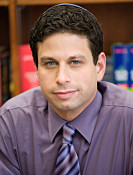Rabbi Daniel Cotzin Burg
It appears t
When I first came to Beth Am, a rabbinic mentor asked: “So which will it be: Torah, Avodah or Gemilut Hasadim?” His point was two-fold: On the one hand he wanted me to focus, to identify, as Joe Reimer has put it, our “Distinctive Torah.” Are we first and foremost, this rabbi was asking, committed to learning, communal prayer or acts of kindness and service? I didn’t blink. “Torah,” I said. Beth Am’s founding over forty years ago was based on robust Jewish learning. Even as we celebrate our designation as “House of the People,” even as we have embraced and attempted to maximize our geographic position in a neighborhood which demands of us tikkun olam, I am cognizant that we are first and foremost about Torah. It is Torah, or what Sid calls chochmah, that drives Beth Am Synagogue. And when it doesn’t, when the learning seems thin or forced, it’s time to reassess whether we’re being true to our core mission and values.
Last year we launched Sages for the Ages, a lecture series in which we invite extra-Jewish (meaning beyond Jewish community) transformational leaders to discuss their work and vision. I developed the series with a congregant who is a prominent sports agent and negotiations expert who interviews our guest before opening it up to Q & A. In 2015 we hosted Kurt Schmoke, former Mayor and the new President of the University of Baltimore. This year, we’ll have Marin Alsop, the celebrated first female conductor of a major American symphony orchestra (the BSO). Without going into great detail here, we have worked hard to embed these speakers’ visits in Torah, selecting them based both on their furthering of the Jewish values agenda and their alignment with our own congregational mission. It’s chochmah, Jewish wisdom applied broadly, and in a way that reminds Beth Am’s members that Judaism, at its core, is about asking the biggest questions, not the most parochial ones.
The other two propositions,–kehillah and tikkun olam–are also central to Beth Am’s success, particularly when experienced through a Torah lens. Our community engagement work, through “In, For and Of, Inc.” helps us to apply particular Jewish values to the more universal context of Central-West Baltimore and its seemingly (but not really) intractable problems. And Beth Am is a true community of people who love and care for each other, speak to each other and newcomers at kiddush lunch and learn from each other.
It is only Sid’s final category, kedushah, with which I possibly take some exception, not with the term nor its validity, but with his framing. I would contend that kedushah is, in fact, in a different category than the other three strategies. The first three are necessarily inter-related: service with community is more valuable than without it; a community which volunteers and encounters the other is stronger; and both tzedek and kehillah don’t work without chochmah or Torah wisdom. But the fourth category stands apart.
A better rubric might be one in which meaning and purpose or kedushah undergirds the others. What drives people to lasting Jewish identification isn’t any of the other three categories on their own, or even together. A great social event, a mitzvah day or a terrifically engaging lesson aren’t in and of themselves compelling. It’s only when we apply these strategies to meaning-making, to helping people discover their greater purpose, that we can be truly successful.
_______________
Rabbi Daniel Cotzin Burg has been Rabbi of Beth Am Synagogue since July of 2010. He blogs at www.theUrbanRabbi.org and has helped to articulate a congregational vision for Beth Am’s community engagement initiative and “In, For Of, Inc.” an independently registered non-profit affiliated with Beth Am which seeks to “build Reservoir Hill relationships.” Rabbi Burg lives near Beth Am with his wife Rabbi Miriam Cotzin Burg and their two children, Eliyah and Shamir.

